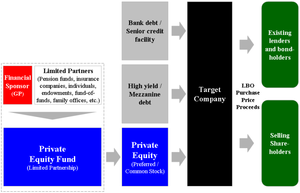Private equity funds are liquidity pools of capital to be purchased business that represent a chance for a high rate of return. They include a set financial investment horizonReturn on Investment (ROI), typically varying from four to 7 years, at which point the PE company wants to beneficially leave the financial investment.
2. Buyout or Leveraged Buyout (LBO)Contrary to VC funds, leveraged buyout funds purchase more mature businesses, normally taking a managing interest. LBOLeveraged Buyout (LBO) funds utilize substantial quantities of leverage to enhance the rate of return. Buyout finds tend to be considerably bigger in size than VC funds. Exit Factors to consider, There are multiple elements in play that affect the exit strategy of a private equity fund.
Private Equity Funds – Financial Dictionary
In regards to a wholesale exit from business, Get it now on Google Books there can be a trade sale to another buyer, LBO by another private equity company, or a share repurchase. In terms of a partial exit, there might be a personal positioning, where another investor purchases a piece of business. Another possibility is corporate restructuring, where external investors get involved and increase their position in the business by partly acquiring the private equity company`s stake.
To keep learning and advancing your profession, the list below resources will be useful:.
What Is A Private Equity Fund? – One Investment Group
Checking out your household history with Origins!.?.!? PE-backed. However what exactly is private equity? A fundamental concept for anyone interested in learning aboutor working in an industry digressive tothe private markets, this blog site breaks down the fundamentals of PE. What is private equity? Private equity (PE) is a kind of financing where money, or capital, is invested into a company.

PE is a significant subset of a larger, more complex piece of the financial landscape referred to as the personal markets. Private equity is an alternative possession class alongside real estate, venture capital, distressed securities and more. Alternative asset classes are considered less traditional equity investments, which indicates they are not as easily accessed as stocks and bonds in the general public markets.
The Jargon From A To Z – Sec.gov
What is a private equity fund? To invest in a business, private equity financiers raise liquidity pools of capital from restricted partners to form a fundalso understood as a private equity fund. Once they have actually hit their fundraising objective, they close the fund and invest that capital into appealing business. Both private equity funds and hedge funds are restricted to recognized investors.
And shared funds are just enabled to collect management fees, whereas PE funds can gather efficiency charges, which is discussed more listed below. How do private equity companies earn money? PE funds gather both management and performance charges. These can vary from fund to fund, however the. Computed as a percentage of assets under management or AUM, typically around 2%.
Private Equity – Milford Asset Management


Determined as a percentage of the profits from investing, typically around 20%. These charges are meant to incentivize higher returns and are paid out to employees to reward their success. How does private equity work? To invest in a company, private equity financiers raise liquidity pools of capital from minimal partners to form the fund.
When a PE company offers one of its portfolio business to another company or investor, the company normally makes an earnings and disperses returns to the minimal partners that purchased its fund. Some personal equity-backed companies may also go public. What are some examples of private equity companies? The Blackstone Group Headquartered in New York City, the financial investment firm invests in PE, real estate and more.
Lehigh Valley Private Equity Fund
So, VC is a type of private equity. Here are some additional distinctions in between PE and VC. Private equity PE companies often purchase fully grown businesses in standard markets. Using capital committed from LPs, PE financiers invest in appealing companiestypically taking a bulk stake (> 50%). When a PE firm offers among its portfolio companies to another company or financier, returns are dispersed to the PE financiers and to the LPs.
Venture capital VC firms typically invest in tech-focused startups and other young companies in their seed. Utilizing dedicated capital, VC financiers normally take a minority stake